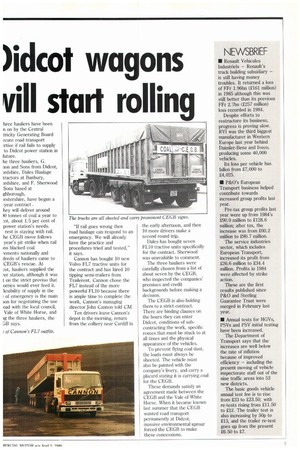)ickot wagons viii start rolling
Page 7

If you've noticed an error in this article please click here to report it so we can fix it.
tree hauliers have been n on by the Central tricity Generating Board !cure road transport ;rtise if rail fails to supply to Didcot power station in future.
he three hauliers, G. non and Sons from Didcot, )rdshire, Dales Haulage tractors at Banbury, mdshire, and F. Sherwood Sons based at ghborough, :estershire, have begun a -year contract.
hey will deliver around 10 tonnes of coal a year to mt, about 1.5 per cent of power station's needs. rest is staying with rail. he CEGB move follows year's pit strike when rail ■ ns blacked coal
rements nationally and dreds of hauliers came to CEGB's rescue. At cot, hauliers supplied the rer station, although it was t on the strict proviso that orries would ever feed it. lexibility of supply in the of emergency is the main on for negotiating the use oad with the local council, Vale of White Horse, and ig the three hauliers, the GB says.
"If rail goes wrong then road haulage can respond to an emergency. We will already have the practice and procedures tried and tested," it says.
Cannon has bought 10 new Volvo FL7 tractive units for the contract and has hired 10 tipping semi-trailers from Trailerent. Cannon chose the FL7 instead of the more powerful FL10 because there is ample time to complete the work, Cannon's managing director John Cannon told CM.
Ten drivers leave Cannon's depot in the morning, return from the colliery near Cardiff in the early afternoon, and then 10 more drivers make a second round trip.
Dales has bought seven FLIO tractive units specifically for the contract. Sherwood was unavailable to comment.
The three hauliers were carefully chosen from a list of about seven by the CEGB, who inspected the companies' premises and credit backgrounds before making a decision.
The CEGB is also holding them to a strict contract. There are binding clauses on the hours they can enter Didcot, conditions of subcontracting the work, specific routes that must be stuck to at all times and the physical appearance of the vehicles.
To prevent flying coal dust, the loads must always be sheeted. The vehicle must also be painted with the company's livery, and carry a placard stating it is carrying coal for the CEGB.
These demands satisfy an agreement made between the CEGB and the Vale of White Horse. When it became known last summer that the CEGB wanted road transport permanently at Didcot, massive environmental uproar forced the CEGB to make these concessions.


























































